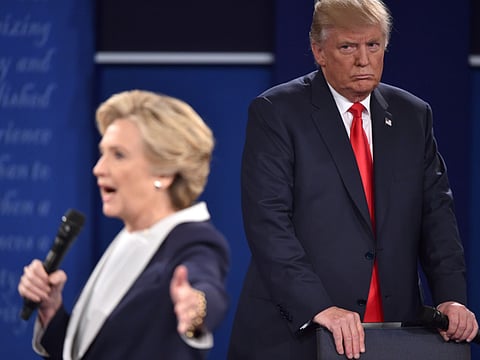Time for a US presidential debate system that can’t be gamed
The schema — rapid fire and lacking real-time context without a second screen — allows Trump to rehash falsehoods with few consequences

If US Republican presidential nominee Donald Trump ‘s candidacy has taught us anything, it’s that the debate format is easily gamed, and — the man’s many shortcomings as a potential commander-in-chief notwithstanding — he is a master of it. Sunday night’s town hall-style one at Washington University in St Louis was no exception to this rule. Seasoned moderators Anderson Cooper and Martha Raddatz, who had clearly prepared with an eye toward not letting Trump get away with as much nonsense as usual, repeatedly allowed him to pivot away to areas he was comfortable in.
Meanwhile Democratic presidential nominee Hillary Clinton, sometimes a bit too eager to defend herself or display her foreign policy knowledge, enabled Trump by engaging him wherever he went. Asked for an opinion on the way forward in Aleppo, Trump, who clearly had nothing to say about the war-torn city, merely repeated the word a couple of times, before redirecting the conversation entirely with a non sequitur, “Let me tell you about Mosul.”
A similar diversion happened with questions around Clinton’s private email server, which Trump always manages to make a centrepiece of debates. Trump’s threat to use the power of the presidency to prosecute his political rival “because there’s never been so many lies, so much deception,” wasn’t strong enough of a statement. He also had to threaten her with incarceration, quipping, when Clinton replied with a comment about how it’s a good thing someone with his temperament is not currently in charge of the law in our country: “Because you’d be in jail!”When the conversation finally did move on from Clinton’s email scandal, Trump reprimanded the moderator for not following up about the emails, a topic that already dominated the commander-in-chief forum in September, an event nominally about foreign policy.
As for his repeated insistence that there’s “never been so many lies”? That isn’t true, according to Politifact, which finds Clinton is an unusually truthful candidate. Not that that’s much of an advantage in our current debate climate. Pithy redirections of substance and reason have resurfaced again and again over the course of the election cycle. It’s become endemic to the way we do debates, as Trump’s rise in the primaries has proved, and it is deleterious to our democracy. We punish the candidates who are honest about what they don’t know, (Gary Johnson’s “what’s Aleppo” moment comes to mind here) and reward the best liars.
In the internet era, and the rise-of-Trump era, society must be able to do better. While it’s important for a potential president to be able to deftly pivot away from uncomfortable questions and set the course of conversation on their terms, these are also the skills of a master propagandist. They are not the most important skills in a leader, who should be able to identify what they don’t know and, in the right context, occasionally admit it. Trump doesn’t bother. Rather he draws blanks in huge areas of policy but he’s never held to account for it, because in debates, as in politics everywhere this year, authenticity is king, even Trump’s authentic disregard for the truth. So it’s hard to say what anyone learnt from the second debate, not because it was conspicuously less substantive than previous ones, but because it was presidential debates as usual.
The truth, and knowledge specifically, is simply not that valuable in a debate format as it exists; voters are simply unable to evaluate it in the framework provided. Experts and the media learnt nothing, but that’s less of an indictment of the system — they’ve heard it all before. But low-information voters could have learnt worse than nothing. As in previous debates and pre-debates, they might have come away from thinking Trump was against the war in Iraq (he wasn’t), that Clinton should have done more to reform health care (she never had the relevant job description), and that Clinton was somehow the reason Trump was able to dodge paying federal taxes (everyone who can do it does do it).
Why should America’s debate system put an emphasis on spontaneity and authenticity and the expense of truth knowledge? There has to be something better than this at this late date, whether it’s a real-time fact check displayed on screen, a sidebar of data-informed commentary, prepared videos that are vetted for accuracy and submitted in advance.
I doubt that authenticity-loving Americans will go for it, but perhaps the public should reconsider. It’s a format that could benefit Trump as much as it would benefit Clinton — he would have the advantage of not having a meltdown on stage, as he’s currently constantly in danger of having. Meanwhile Clinton and the rest of us, would hear a whole lot fewer lies. We already know enough about Trump’s temperament from the way he uses his Twitter account, and it would certainly be an improvement on the current situation, which seems to be an exercise chiefly in spreading voter misinformation. But don’t expect Trump to lead the charge to reform US presidential debates. As his campaign manager Kellyanne Conway put it shortly after the town-hall style debate drew to a close, it’s “a great format for him.” The entire 2016 presidential election thus far is the proof that she’s right.
— Guardian News & Media Ltd
Lucia Graves is a political writer in Washington DC.



